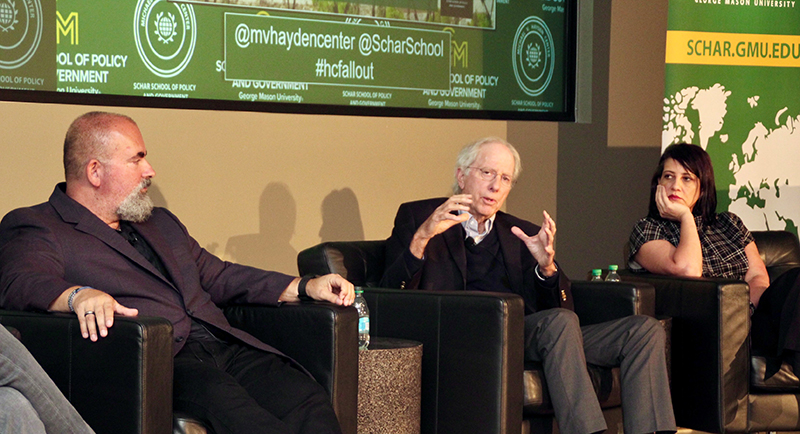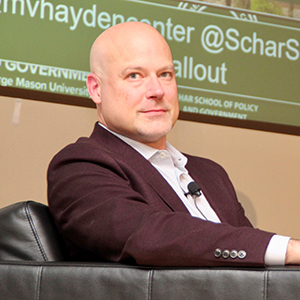

A diverse audience of 160 individuals from 28 states and 15 countries gathered, both virtually and in person, on Tuesday, October 15, for the Michael V. Hayden Center for Intelligence, Policy, and International Security’s highly anticipated fall event, “October 7th Fallout: One Year Later.”
The evening, held at George Mason University’s Mason Square auditorium in Arlington, Virginia, and hosted by the Schar School of Policy and Government, was charged with anticipation as participants from the fields of diplomacy, media, and intelligence came together to explore the far-reaching implications of a tragic event.
A video of the conversation is available on the Hayden Center YouTube channel here. The discussion also was taped by CSPAN for future broadcast.
The panel covered the ongoing global response to the events of October 7, 2023, when the terrorist group Hamas invaded Israel and murdered 1,200 civilians, including 40 Americans. The panelists explored the rising tensions between Israel, Iran, and Iran’s proxies, including Hamas, Hezbollah, and the Houthis. They also discussed the future of U.S. Middle East policy, diplomacy, intelligence, and possible defense and military implications.
Moderator David Priess, a Hayden Center senior fellow who served at the CIA as an intelligence officer, manager, and daily intelligence briefer, guided the conversation with firm authority, covering the broad range of hot-button topics at a brisk pace.
The panelists brought decades of experience in the Middle East to the stage.
Ambassador Dennis Ross played a leading role in shaping U.S. involvement in the Middle East peace process, offering insights from his direct negotiations during the Bush and Clinton administrations. He currently serves as a counselor at the Washington Institute for Near East Policy.
Nancy Youssef, an award-winning national security correspondent for the Wall Street Journal, focused on the U.S. military and the Arab world. She is recognized for her coverage of international conflicts and military operations, including the wars in Iraq and Afghanistan.
MSNBC national security analyst Marc Polymeropoulos, who worked for 26 years at the CIA specializing in counterterrorism, opened the event with a bold assertion: October 7 represented a catastrophic intelligence failure fueled by an overreliance on technology and a disconnect between military leadership and ground-level insights.
Ross added that intelligence failures like these are something diplomats can address by determining what resources are necessary to reassure our allies’ security post-crises. He determined that peace between the Palestinian and Israeli people is only possible by somehow lowering psychological pain and political differences among those in the region.
Youssef expressed her concerns about the future of U.S. involvement in Israel following October 7, asking, “How long can we maintain this, and at what cost?” She pointed out that U.S. policy in the Middle East has often involved sending troops to address temporary crises, only to later withdraw them. She also voiced her worry about the U.S. ability to balance military commitments in both Ukraine and Israel. Additionally, she noted that while human intelligence in the Arab world is lacking, many journalists are stepping up, risking their lives and those of their families to provide crucial information.
The event ended with the fielding of questions from the audience, including one that wondered how the perception of the Muslim community has changed post October 7?
Like 9/11, Polymeropoulos said drawing a parallel to that world-changing attack, there has been heightened profiling of the Muslim community. At the same time, there is concern around the world that engaging to destroy Hamas, Hezbollah, and the Houthis will spur more lone wolf attacks and Islamic radicals.
Another audience member asked Ross if he had a vision for state building for Lebanon? He candidly acknowledged the challenges of maintaining stability in the absence of Hezbollah’s leadership, underscoring the complexities of establishing a more democratic government without a military presence on the ground.
Consider supporting the Hayden Center with a donation. Please click here.
Additional reporting by Buzz McClain.
